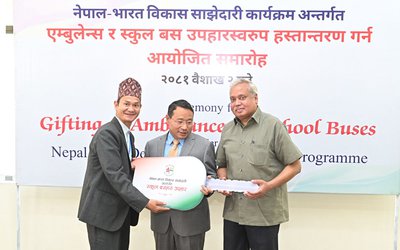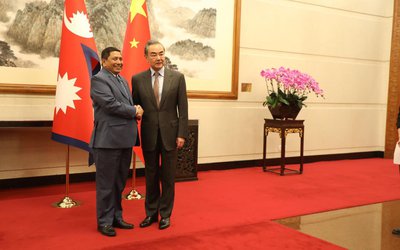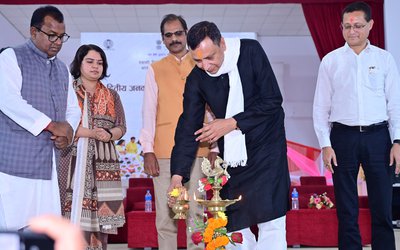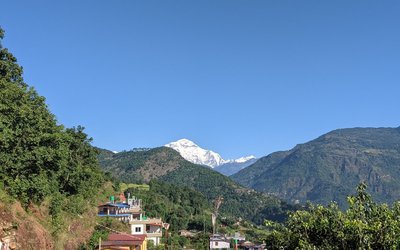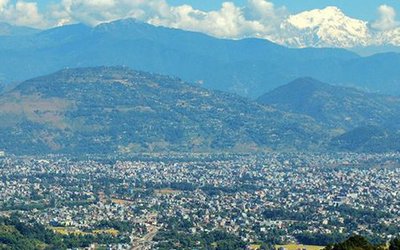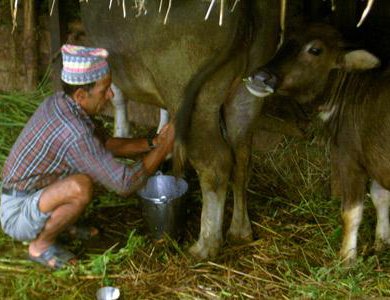
At a time when the government's major projects have failed to fulfill their promises to change the livelihood, small farmers in Nepal's four districts have proved that they have the ability to improve their own conditions through dairy, given they have the appropriate concept and technology.
Cash starved, with weak bargaining power and subsistence based technology, small landholders in Chitwan, Gorkha, Dhading and Tanahu districts had gotten frustrated in doing the dairy business and many gave up hope. Thanks to the implementation of the Market Access for Smallholder Farmers (MASF), implemented by Practical Action, the situation has drastically changed and these same small farmers now have reason to rejoice. Their new choice is: dairy.
Nepal's top policy makers usually adopt and approach that takes development of big infrastructure as something that will automatically bring changes in livelihood. However, the approach has failed throughout the country. Although farmers of all these four districts have access to fair-weather highway through which they are connected to major markets and other facilities around, they don't see much economic sense in that.
To make this big infrastructure workable in favor of small farmers, there is the need of interventions at small scales through market management, breed change, animal health and community based cooperatives. However, the government’s agriculture strategy focuses more on big farmers. Practical Action's MASF has succeeded to make changes because of its model where Private, Public and Cooperative organisations come together.
"The project is successful because we were able to link different stakeholders together in the interest of small farmers," said Sujan Piya, Ph.D, head of program, Agriculture, Food Security and Markets. "During the project period, Practical Action brought all the different stakeholders, the government's livestock offices, private investors and combined unity of local farmers made through formation of cooperatives."
In a country of overwhelming numbers of small and marginal farmers, just by constructing huge infrastructure like highways to link farms to markets cannot yield the desired results. Side by side, another approach to make such highways beneficial for overwhelming number of small farmers, who do not have the capital, technology and capacity to compete in market with bigger players, is also needed.
“The government livestock program is now focusing on small farmers. The government is aware that Nepal cannot make changes without improvement of livelihood of millions of poor farmers who are involved in the dairy sector,” said Dr. Dinesh Parajuli, Central regional director of Livestock Department.
As Neal imports billions of rupees of milk from India during the lean session every year, improvement in milk production can change the scenario. As long as the government does not exploit the small farmers’ potential by introducing participatory approach, nothing will change. Individually, small farmers cannot afford the veterinary service, high breed and improved grass, which require investment. The farmers in all these four districts have shown how participatory approach brought change in the dairy business.
“We are collaborating with various NGOs and INGOs and benefiting from their successful model,” said the spokesperson of the Ministry of Agriculture Development.
According to Practical Action, MASF explored a participatory and systematic market development approach to reduce vulnerability and secure livelihoods by applying technology for better production and networking skills to engage effectively in fairer markets.
Market and livelihood program is successful to increase the access of smallholder farmers to established market. The project supports poor communities by making market for them and explores a participatory and systematic market development approach to reduce vulnerability and secure livelihoods by applying technology for better production and networking skills to engage effectively in fairer markets.
According to Practical Action, MASF supported 12,367 small farmers covering 50 percent women, 10 percent dalit, 28 percent disadvantaged Janjati and 20 percent youths. Under the project, the farmers were supported with training on basic livestock management, shed improvement, cattle health management, grass production, mineral bock preparation, safe disposal of dairy waste and quality of milk. Through the project, 71 existing milk collection centers were strengthened and 48 new collection centers were established in coordination with local authorities and cooperatives, resulting in increased milk collection and providing such needed storage facilities for smallholder dairy farmers.
As a result, smallholder dairy farmers from more than 8281 households are supplying milk to major milk processors.
As access to improved breed appeared as one major constraint in commercial cattle farming, the project also initiated the concept of improved Breed Resources Center. The project imported sexed semen of improved breed of cattle for the first time in Nepal. The imported semen was handed over to National Livestock Breeding Center.
- TANAHU HYDROPOWER PROEJCT: A Significant Achievement
- Apr 15, 2024
- AMBASSADOR HANAN GODAR: Sharing Pain With A Nepali Family
- Mar 30, 2024
- VISIT OF KfW AND EIB TO NEPAL : Mission Matters
- Mar 25, 2024
- NEPAL BRITAIN SOCIETY: Pratima Pande's Leadership
- Mar 24, 2024
- NEPAL ARMY DAY: Time To Recall Glory
- Mar 15, 2024




